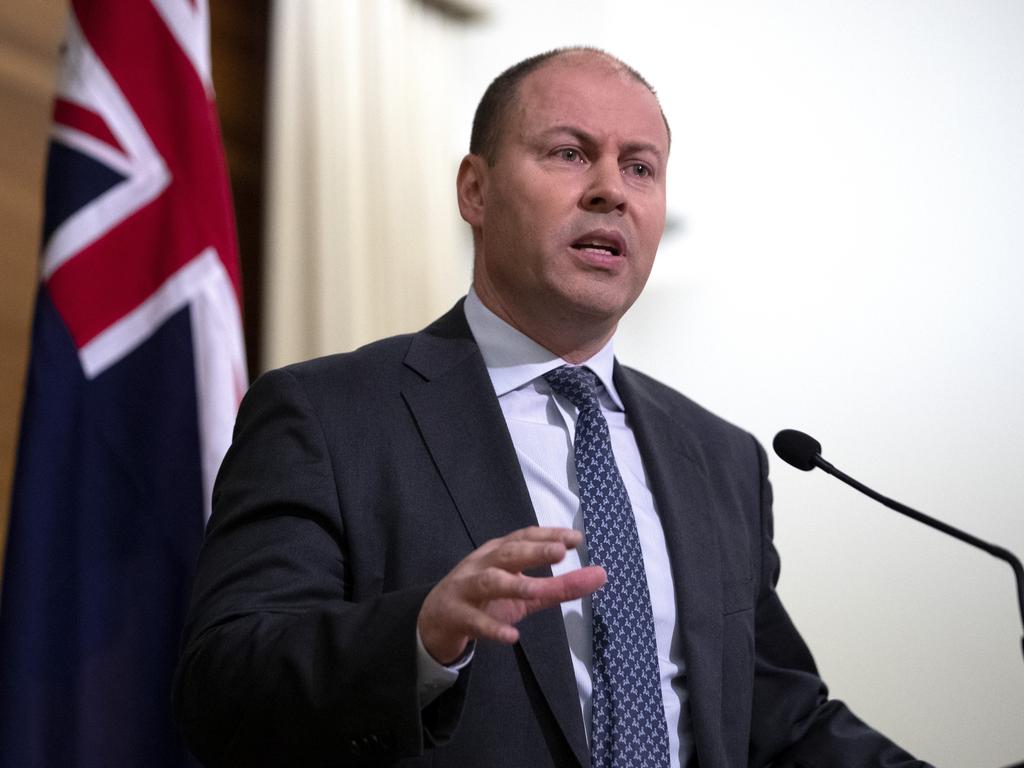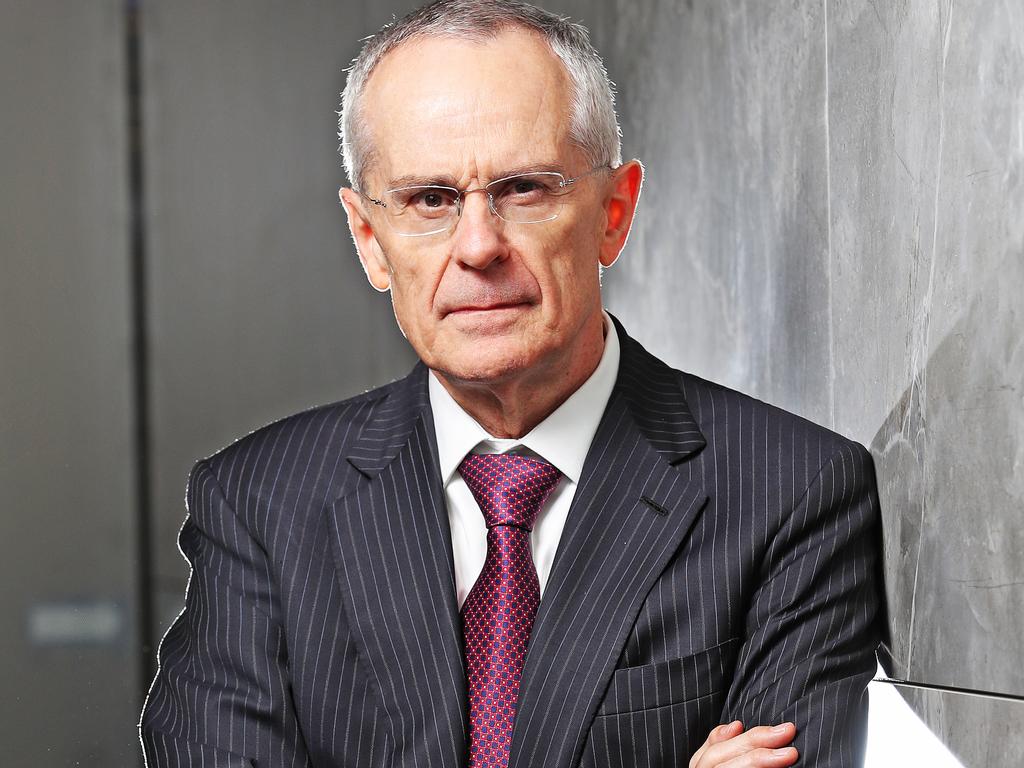Australia releases draft mandatory code to regulate how Facebook and Google pay for news
Australia is on track to become the first country in the world to order Google and Facebook to pay for news content after a landmark code was unveiled.
- Huawei infiltrates Australia despite Chinese espionage risks
- Light bulbs, locks and doors: 10 ways your home can be hacked
Australia is on track to become the first country in the world to order Google and Facebook to pay for news after a landmark code was unveiled this morning.
Federal Treasurer Josh Frydenberg revealed the ACCC’s news bargaining code in Canberra, saying it was designed to create a “level-playing field” for Australian media businesses that were forced to work with the powerful multibillion-dollar firms.
The code comes one year after the ACCC handed down the results of an 18-month investigation into digital platforms that recommended tech giants share revenue obtained “directly or indirectly” from news content on their platforms, which generate billions of dollars in advertising every year.
“It’s about a fair go for Australian news media businesses, it’s about ensuring that we have increased competition, increased consumer protection, and a sustainable media landscape,” Mr Frydenberg said.
“Nothing less than the future of the Australian media landscape is at stake with these changes.
“It became apparent to us a number of months ago that we weren’t making progress on that critical issue of payment for content.
“Hence we are moving down the path of a mandatory code. A mandatory code that governs those relationships and covers issues such as access to user data, the transparency of algorithms used by the digital platforms for the ranking and the presentation of media content, as well as of course payment for content.
“We want Google and Facebook to continue to provide these services to the Australian community which are so much loved and used by Australians.
“But we want it to be on our terms. We want it to be in accordance with our law. And we want it to be fair. And that is what has motivated us with this mandatory code.”
The ACCC code of conduct will require Google and Facebook to compensate commercial news media businesses such as Nine Entertainment, Seven West Media, and News Corp for the use of their content, with negotiations due to be settled within three months.

If they cannot reach an agreement, Mr Frydenberg said negotiations would go to “binding final-offer arbitration,” and laws are expected to be introduced to Parliament within months.
Government-funded organisations ABC and SBS will benefit from other parts of the scheme, including more information about algorithm changes.
News Corp’s submission to the inquiry, which is available publicly, lobbied for the ABC to be included as a beneficiary.
Mr Frydenberg said the code would also include substantial penalties if Facebook and Google sought to break the new rules, including fines of up to “$10 million per breach or three times the benefit obtained or 10 per cent of annual turnover, whichever is greater”.
“I think this is a better set of recommendations and a better pathway going forward than what we’ve seen elsewhere,” Mr Frydenberg said.
“It’s the product of 18 months worth of work, extensive consultation, and our law will set up for a more level playing field.”
The news code will also force Google and Facebook to share some data with news businesses, including warning them about changes that affect the way they show local news content, and create a way for media organisations to contact the international firms.
Despite a long wait for its creation, the news code could make Australia the first country to force multibillion-dollar tech giants to pay media organisations for the use of their content after failed attempts overseas.
ACCC chairman Rod Sims said the regulator “observed and learned from the approaches of regulators and policymakers internationally that have sought to secure payment for news”.
“There is a fundamental bargaining power imbalance between news media businesses and the major digital platforms, partly because news businesses have no option but to deal with the platforms, and have had little ability to negotiate over payment for their content or other issues,” he said.
“We wanted a model that would address this bargaining power imbalance and result in fair payment for content, which avoided unproductive and drawn-out negotiations and wouldn’t reduce the availability of Australian news on Google and Facebook.”
Mr Sims also dismissed suggestions that Google could remove Australian news from its news portal and search results to get around the laws due to the way the code was structured and the fines built into it.

“That won’t make one jot of difference to this mandatory code,” Mr Sims said.
“We really hope the platforms also recognise that this is a move whose time has come.”
But Google Australia and New Zealand managing director Mel Silva slammed the draft code, saying it did not offer “incentives” for digital platforms to innovate, did not take into account web traffic Google provided to Australian news outlets, and put Google services in Australia at risk.
“The Government’s heavy-handed intervention threatens to impede Australia’s digital economy and impacts the services we can deliver to Australians,” she said.
Facebook did not respond to requests for comment.
News Corp Australasia executive chairman Michael Miller welcomed the announcement, however, and called the draft code a “watershed moment to benefit all Australians,” as it had the potential to secure a future for Australian news providers.
“The tech platforms’ days of free-riding on other peoples’ content are ending,” Mr Miller said.
“They derive immense benefit from using news content created by others and it is time for them to stop denying this fundamental truth.”
Mr Miller said the draft code of conduct also ensured Google and Facebook could not “walk away from negotiations with news creators” as they had done in the past.
Media and legal experts say the ruling could deliver an important “lifeline” to an industry vital to Australian democracy and one that had been hard hit by the growing dominance of two international firms.
Swinburne University social media senior lecturer Dr Belinda Barnet said Australian newsrooms had been “pummelled by digital giants” in the online advertising market and ensuring they received a fair cut of revenue was “critical to keeping democracy alive” and Australians informed.
But she warned there was still a risk the tech giants could seek to get around the new rules, simply to avoid setting an international precedent in Australia that could be used by other countries.
MORE NEWS
Google sued for misleading Aussie users
Optus freezes prices in telco war
‘Alarming’: Australia must expose foreign cyber spies
“Facebook in particular is really reluctant to have that kind of agreement in place and working in a country like Australia because other countries will look to Australia and say, ‘why can’t you do it over here’,” she said.
“Part of me suspects they won’t pull up stumps but find a sneaky way to get around it so it doesn’t set a precedent.”
UNSW Business School associate professor Dr Rob Nicholls said the ACCC had tackled the issue in a different way to overseas regulators, from a competitive standpoint rather than on copyright.
He said other countries would be watching closely to see if it worked and what the tech giants would pay for news on their platforms.
“If I was a French publisher, I’d be looking at Australia and saying if the value is this, we can scale that by our population and that will be our number,” he said.
“It potentially creates a global benchmark.”
Q&A: AUSSIE NEWS AND THE TECH GIANTS
Why does the ACCC say tech giants should pay for the news they use?
In a comprehensive, 18-month probe into digital platforms, Australia’s competition watchdog found Facebook and Google were “benefiting from a significant imbalance in bargaining power in their commercial negotiations with Australian news media businesses”.
Both companies had become “unavoidable trading partners” for Australian media organisations but did not share the revenue generated from using content created and funded by the publishers.
Why is the Australian Government taking this action?
The ACCC said that “news provides broad benefits to society beyond those individuals who consume it, but Australian news businesses risked being “undermined” by unfair commercial arrangements with online platforms and could be forced out of business.
Many Australian media outlets have already been forced to close during 2020, including 10Daily, BuzzFeed Australia, eight magazines from Bauer Media, and 36 regional and community News Corp newspapers.
Who will pay for using news under this scheme?
The Digital Platforms Inquiry named Facebook and Google as the companies to pay for Australian news content, though said the scheme could be extended to other digital platforms in future as “digital platform and news media industries continue to evolve”.
How many people see news stories from Australian publishers on Facebook and Google?
The ACCC found 32 per cent of readers visited Australian news websites through Google, and 18 per cent visited via Facebook in the 2017-2018 financial year.
Google’s influence was more pronounced for print and online outlets (34 per cent), while Facebook played a bigger role for TV and radio broadcasters (20 and 55 per cent respectively).
What Australian news organisations could be paid for their work under this bargaining code?
The ACCC has included a broad range of businesses in the code, including print, online-only, TV and radio outlets.
This will include both commercial organisations such as Nine Entertainment, Seven West Media, and News Corp which could receive funds from Google. Government-funded organisations ABC and SBS will benefit from other parts of the scheme, including more information about algorithm changes.
How much will the tech firms pay?
Negotiations will take place over the coming weeks, with negotiations closing on August 28. Laws to support the new code are due within “months”.
Do tech giants pay for news in other countries?
Not often.
Facebook has ardently rejected calls to pay for news stories published on its platform, though last year revealed plans to introduce a “news” tab to its service. It promised to pay about 200 US publishers for content under the scheme, which has yet to launch.
Google last month announced it was negotiating with a small group of publishers in Australia, Brazil and Germany to pay for premium news content. The move, one month before the ACCC’s announcement, was criticised as a way to avoid new laws.
In April, France’s competition watchdog ordered Google to negotiate with local publishers on ways to pay for their content.
And, in 2014, the Spanish government changed copyright laws to force Google to pay for the snippets of stories published on its platform. Google responded by removing Spanish outlets from its news sites worldwide.
Could this have implications for other countries?
Yes. If it is successfully implemented, experts say the Australian scheme could be adopted in other countries to ensure media organisations can continue to break and report news.
What else would the news bargaining code do?
The ACCC says tech giants should also prioritise original news content on their platforms to reward publishers and ensure users have access to accurate information, give Australian news organisations advance notice of “significant algorithm changes” affecting their content, and provide some information about users who access their content.



